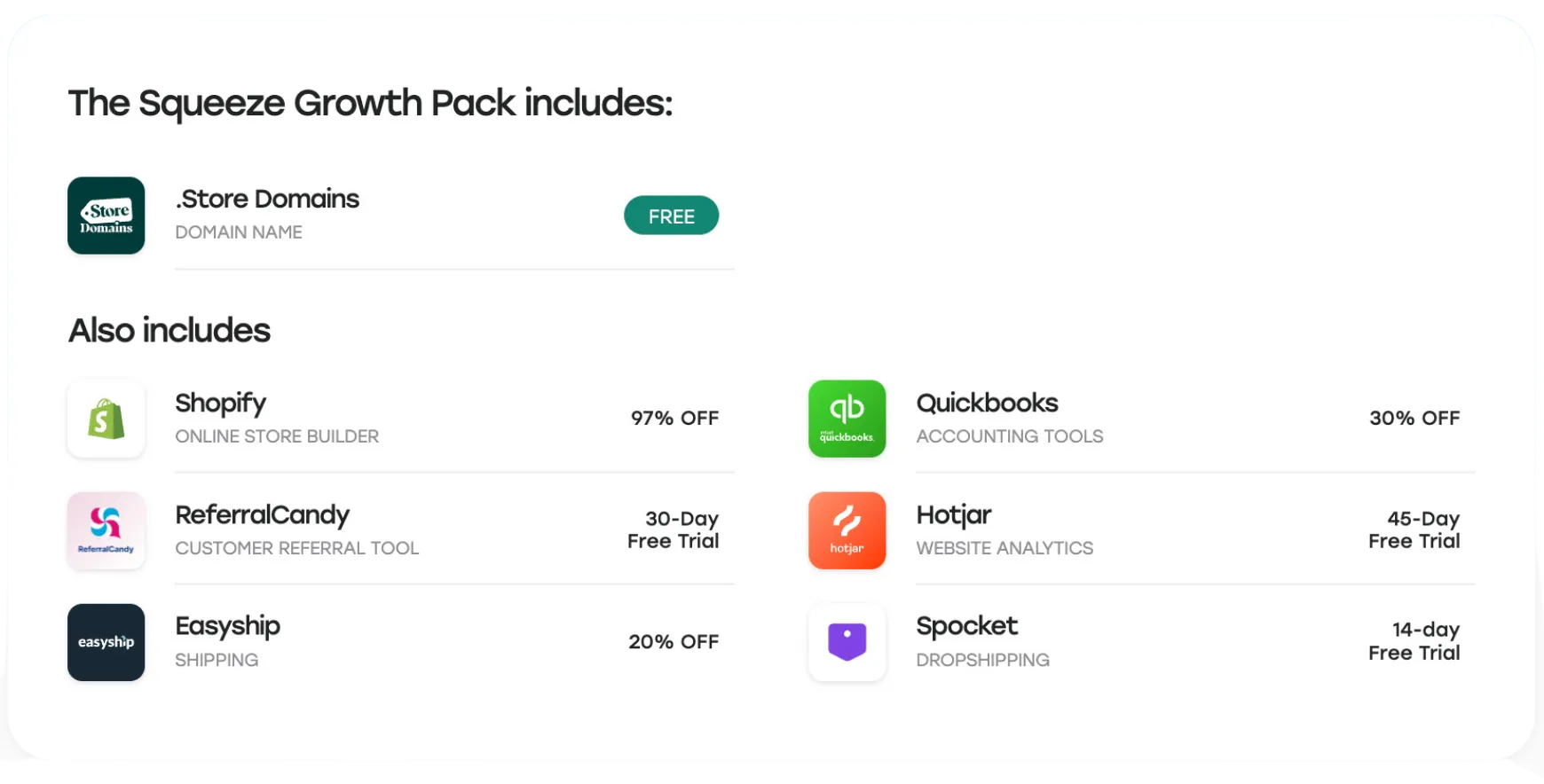
The issue isn’t that we don’t have enough apps – it’s that most apps are built around an unrealistic idea of how people work.
They assume we’re robots who can perfectly estimate how long tasks will take, never get interrupted, and always stick to our schedules.
But real work isn’t like that. Real work is messy.
A “quick meeting” runs 30 minutes over. Your boss has dropped an urgent request on Slack. Your kid’s school calls. And suddenly your perfectly planned day falls apart.
The good news?
Some apps get this. They’re designed for humans, not robots.
The best planning apps don’t just help you make lists – they help you deal with reality. They automatically reschedule tasks when meetings run long.
They protect your focus time. They learn your work patterns and adjust accordingly.
I’ve tested dozens of daily planner apps, and I’ve found 12 that understand how real people work.
I’ll show you which ones are worth your time, what makes each one special, and most importantly – which one might help you have better days.
If you’ve ever felt that existing productivity apps just don’t match how you work, you’re going to find this interesting.
The Best Daily Planner Apps For Android
| App Name | Best For | Free Trial/Plan? | Starting Price |
| Sunsama | Realistic time management & tool integration | 14-day free trial | $16/month (annual) |
| Motion | AI-powered automatic scheduling | 14-day free trial | $19/month (annual) |
| Todoist | Simple, flexible task management | Free plan available | $4/month (Pro) |
| TickTick | Focus-oriented task management | Free plan available | $3/month (Premium) |
| Any.do | Family & personal task coordination | Free plan available | $7.99/month |
| Notion | Connected workspace & planning | Free plan available | $10/month (Plus) |
| Marvin | Psychology-based productivity | 30-day free trial | $8/month (annual) |
| Akiflow | Universal task aggregation | 7-day free trial | $19/month (annual) |
| Morgen | Calendar & task integration | Free plan available | $9/month (Pro) |
| Structured | Visual timeline planning | Free plan available | $4.99/month |
| Bordio | Visual time management | Free plan available | $9.99/month |
| Google Calendar | Basic schedule management | Free | Free (Premium with Workspace: $6/month) |
1. Sunsama

Sunsama is a daily planning and task management platform that unifies your work tools, calendar, and communication channels into a streamlined workflow focused on realistic time management.
When you first open Sunsama in the morning, something different happens. Instead of facing an overwhelming list of tasks, you’re guided through a deliberate planning routine.
This matters because most of us don’t actually plan – we just react to whatever seems most urgent.
Sunsama’s strength comes from its deep integration ecosystem. Tasks flow seamlessly from Asana, ClickUp, GitHub, Jira, Linear, Monday, Notion, Todoist, and Trello.
But Sunsama doesn’t just import tasks – it maintains a two-way sync. Complete something in Sunsama, and it’s marked done in your original tool.
Calendar management in Sunsama reflects how real work happens. It connects with Google, Outlook, and iCloud calendars bi-directionally.
When you schedule a task block in Sunsama, it appears in your calendar. When someone books a meeting in your calendar, it shows up in Sunsama.
Email and message handling shows particular insight into modern work patterns. Instead of constantly switching between Gmail, Outlook, Slack, and Teams, you can convert messages into scheduled tasks.
Sunsama solves a fundamental problem:
The disconnect between what we plan to do and what we can realistically accomplish.
By combining intelligent task management with time-awareness, it helps create workdays that make sense.
Features
- Guided Daily Planning: Step-by-step routine for intentional day planning
- Unified Daily View: Combines tasks, emails, and meetings in one interface
- Timeboxing: Schedule tasks directly to your calendar with realistic time blocks
- Project Tool Integration: Syncs with Asana, ClickUp, GitHub, Jira, Linear, Monday, Notion, Todoist, and Trello
- Email Integration: Convert Gmail and Outlook emails into scheduled tasks
- Weekly Review: Track progress and plan upcoming weeks
- Focus Mode: Minimize distractions for deep work sessions
- Analytics Dashboard: Track time usage patterns and productivity trends
Price & Plans
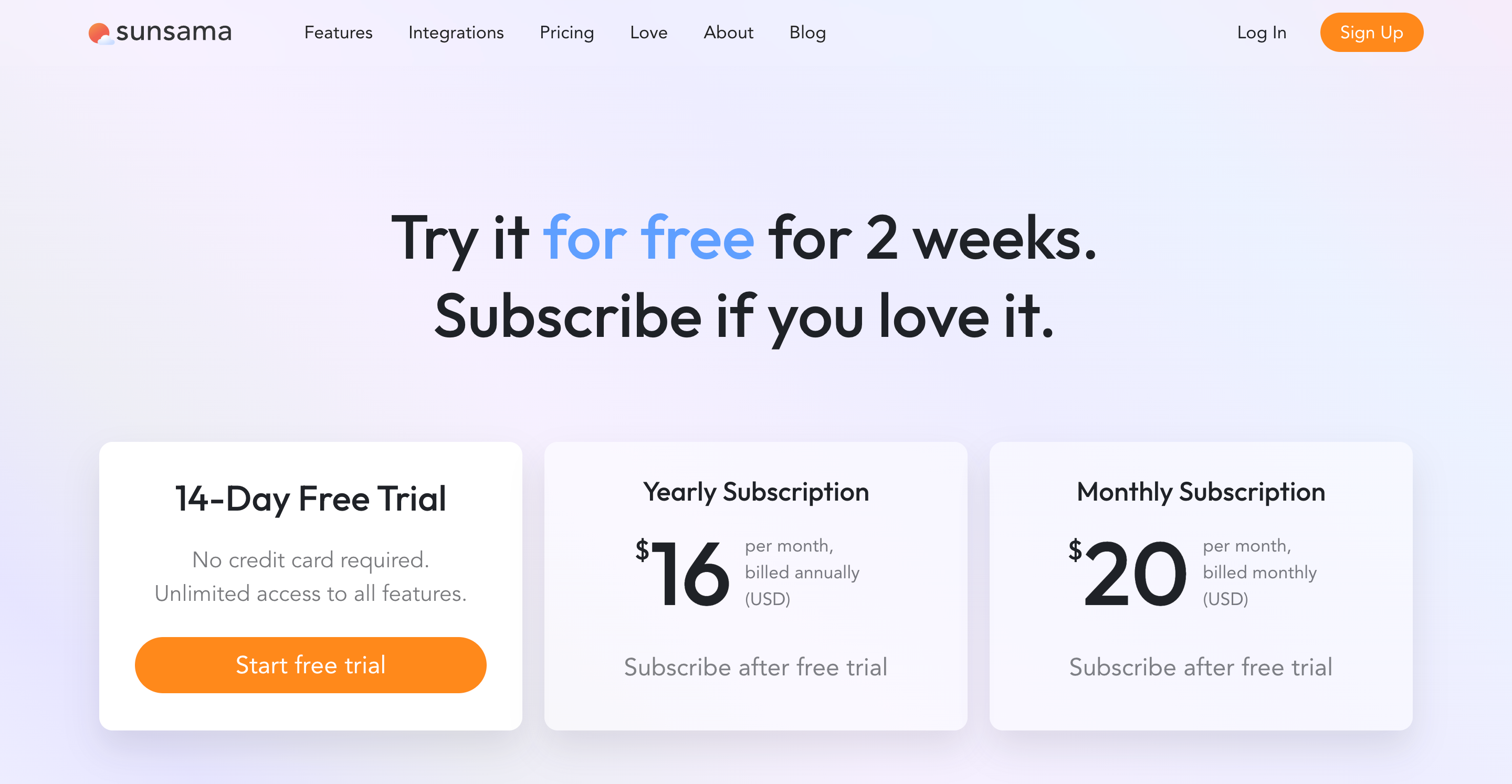
Sunsama offers a straightforward pricing structure with a 14-day free trial that doesn’t require a credit card. During the trial period, you get unlimited access to all features.
After the trial, you can choose between two simple plans:
- Monthly Plan: $20 per month
- Annual Plan: $16 per month (billed annually)
Both plans include full access to all features, including integrations, analytics, and premium functions.
2. Motion

Motion is an AI-powered daily planner that does what a $200/hour executive assistant would do:
It automatically schedules your tasks, optimizes your meetings, and rebuilds your calendar when things change.
Instead of asking you to manage tasks, Motion manages them for you. Feed it your tasks and meetings, and it creates a minute-by-minute schedule optimized for your working style.
This is different from what we saw with Sunsama. While Sunsama guides you through intentional planning (which works great for many), Motion automates the entire process.
The AI doesn’t just schedule tasks—it thinks like a productivity expert.
It knows to bunch meetings together if you prefer that. It guards blocks of time for deep work. It warns you when you’re overcommitted.
What’s particularly clever is how it handles interruptions. When a last-minute meeting crashes into your day (and they always do), Motion automatically reschedules everything else.
Motion lets you set daily meeting limits and preferred times, then shows only those slots to others. It’s a subtle way of saying “my time matters” without having to actually say it.
The integrations are comprehensive—Google Calendar, Outlook, Zoom, Teams, and even Siri.
Features
- AI Task Scheduling: Automatically schedules and prioritizes tasks around your calendar for optimal productivity
- Smart Meeting Management: Set meeting limits, and preferences, and let Motion optimize meeting times for your schedule
- Calendar Integration: Syncs with Google Calendar, Outlook, and iCloud calendars for unified schedule management
- Custom Booking Pages: Create personalized meeting scheduling pages with custom templates and survey questions
- Deep Work Protection: Guards focused work time and automatically reschedules tasks when interruptions occur
- Video Meeting Integration: Direct integration with Zoom, Google Meet, and Microsoft Teams for seamless conferencing
Price & Plans

Motion starts with a risk-free 14-day trial that gives you unrestricted access to all features.
For individuals, Motion is available at $34 per month ($19 per month when billed yearly), which includes the complete suite of AI-powered scheduling features, calendar management, task organization, and meeting optimization tools.
You’ll also get access to both desktop and mobile apps to keep your productivity synced across all devices.
Teams of less than 20 members can opt for the Business Standard plan at $20 per member per month ($12 per month on yearly billing).
All plans come with Motion’s core AI capabilities, calendar integrations, and task management features.
3. Morgen

Morgen is a daily planning platform that consolidates your calendars, tasks, and team scheduling into a single, AI-enhanced workspace that protects your productive hours.
Morgen gives you intelligent tools to make better decisions about your time.
Take calendar management.
Morgen maintains true bi-directional integration across Google, Outlook, Apple, and Exchange. When you move a meeting, it updates everywhere instantly.
The task integration system builds on what Todoist and TickTick offer.
Beyond simple task management, Morgen lets you convert any task into a time-blocked calendar event with a single drag.
More importantly, it maintains the task’s context and connections to your project management tools like Notion, Linear, or ClickUp.
Morgen’s AI can suggest small scheduling adjustments that create longer blocks of uninterrupted time for your entire team.
The natural language command bar deserves special mention. Unlike the basic input we saw in Any.do, Morgen’s implementation understands context.
Type “meet with marketing next week when Jim is free” and it actually checks Jim’s availability across all his calendars.
Features
- Calendar Unification: True bi-directional sync across all major calendar platforms.
- Intelligent Time Blocking: Convert tasks to calendar blocks while maintaining project context.
- Focus Protection: AI-powered meeting optimization that guards deep work time.
- Task Integration Hub: Direct connection with Notion, Todoist, Linear, ClickUp, and more.
- Smart Team Scheduling: Availability checking that considers productivity patterns.
- Natural Language Processing: Context-aware command bar for rapid scheduling.
Price & Plans

- Free: Essential calendar management with limited integrations.
- Pro: $15/month ($9 per month on annual billing) for unlimited calendars, mobile access, and AI features.
Students and nonprofits receive a 25% lifetime discount.
4. TickTick

TickTick is what happens when a task manager grows up and realizes that getting things done isn’t just about listing tasks – it’s about building sustainable habits and actually focusing long enough to complete them.
TickTick lets you capture tasks however they come to you – voice notes, emails, widgets, or even location-based reminders that ping you when you walk into your office.
What’s fascinating is how TickTick handles the execution side of productivity. It has a built-in Pomodoro timer with white noise options.
TickTick’s Pomodoro integration means you’re not just organizing tasks – you’re creating focused work sessions around them. It becomes both the what and the how of productivity.
Unlike Todoist’s sync, which focuses primarily on task data, TickTick maintains your entire productivity environment, including timer states and focus sessions.
There’s also this clever achievement system that gamifies consistency rather than just completion.
The collaboration features are there too, but they’re implemented with a subtlety that’s missing from most team tools.
You can share lists and assign tasks, but TickTick maintains a clear separation between personal productivity and team coordination – similar to what we saw in Todoist, but with the added dimension of focus tracking.
Features
- Task Capture & Organization: Voice input, email integration, smart date parsing, and location-based reminders
- Focus Tools: Built-in Pomodoro timer with white noise, achievement tracking, and productivity statistics
- Calendar Management: Multiple views and external calendar subscriptions for comprehensive scheduling
- Team Collaboration: Shared lists, task assignments, and activity tracking
- Habit Building: Achievement scores and statistics to track productivity patterns
- Smart Lists & Filters: Customizable views and sorting options for personalized task organization
Price & Plans

TickTick offers a capable free tier and a Premium plan that runs $35.99 annually (about $3 per month).
5. Any.do

Any.do is a daily planning and task management app that brings structure to your personal tasks, family coordination, and team projects in one unified system.
The core of Any.do’s approach is the My Day planner.
Each morning, it presents your tasks with smart suggestions about what deserves attention today. It suggests priorities but lets you make the final call.
Any.do’s AI assistant takes a notably different approach from what we saw with Motion.
Instead of attempting to manage your entire schedule, it focuses on specific tasks where AI actually adds value:
- breaking down complex projects
- suggesting task priorities
- and automating repetitive work.
Task capture in Any.do shows deep attention to real user behavior.
While Todoist excels at natural language input, Any.do go further by integrating with WhatsApp.
You can create tasks and receive reminders right in your WhatsApp chats – perfect for capturing thoughts while messaging family or colleagues.
Any.do’s approach to views deserves attention. Like TickTick, it offers multiple ways to see your tasks – Kanban boards, calendar views, and list formats.
But Any.do adds custom views that let you create specific perspectives for different aspects of your life.
You might have one view for home renovation projects and another for work deadlines.
Features
- My Day Planner: Smart daily task suggestions with a fresh start each morning
- WhatsApp Integration: Create and manage tasks directly through chat
- AI Task Assistant: Focused AI helps with specific productivity challenges
- Family Management: Dedicated spaces with smart grocery lists and project tracking
- Multiple Views: Customizable Kanban, calendar, and list formats
- Smart Reminders: Context-aware location and time-based alerts
Price & Plans
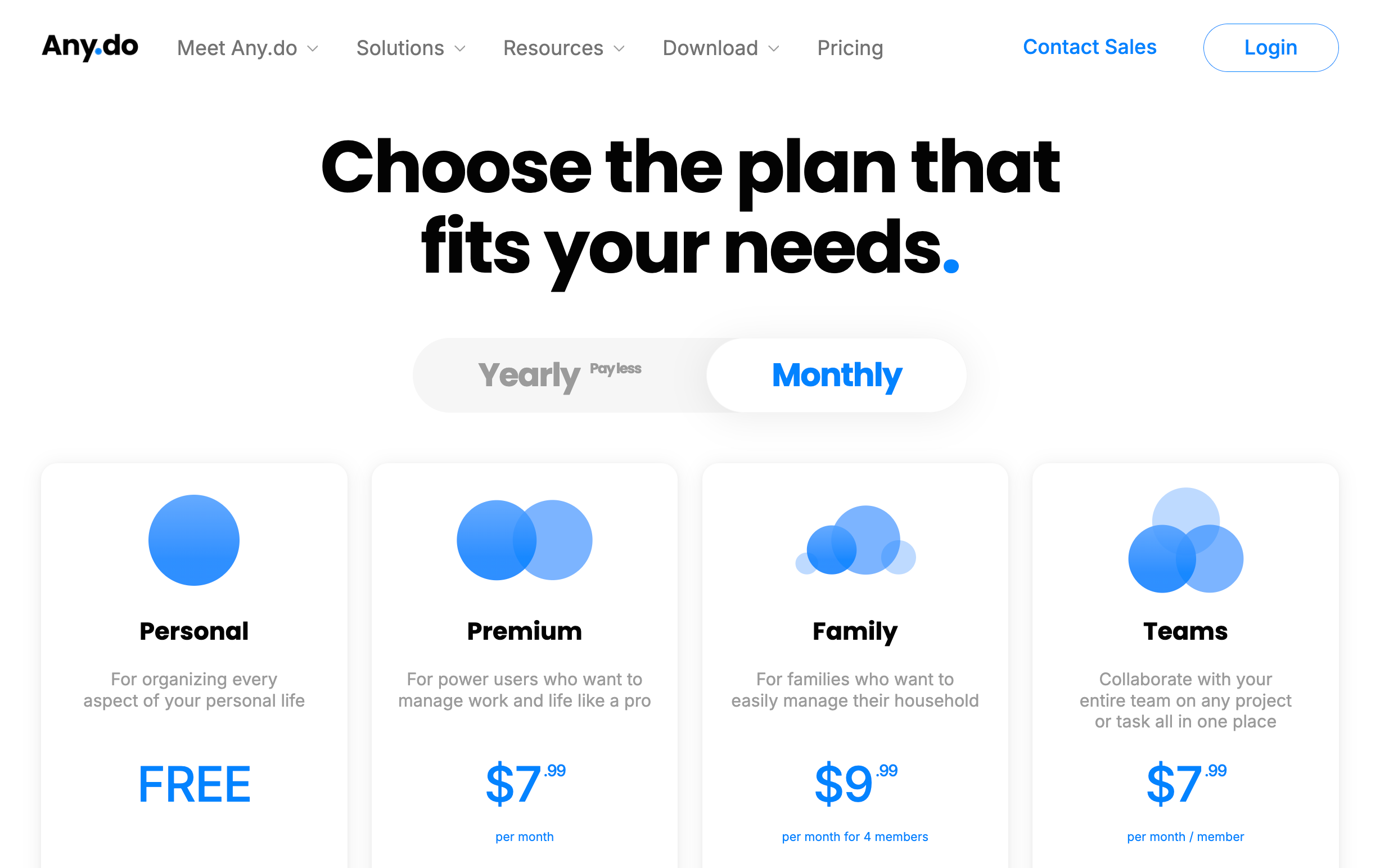
Any.do offers three thoughtfully structured plans:
Free Plan: Core task management and basic planning features
Premium ($7.99/month): Adds recurring tasks, location reminders, and AI features
Family ($9.99/month): Supports up to 4 members with shared spaces and advanced family features
Team ($7.99/month per member): Unlimited collaborative workspaces with admin controls
6. Notion
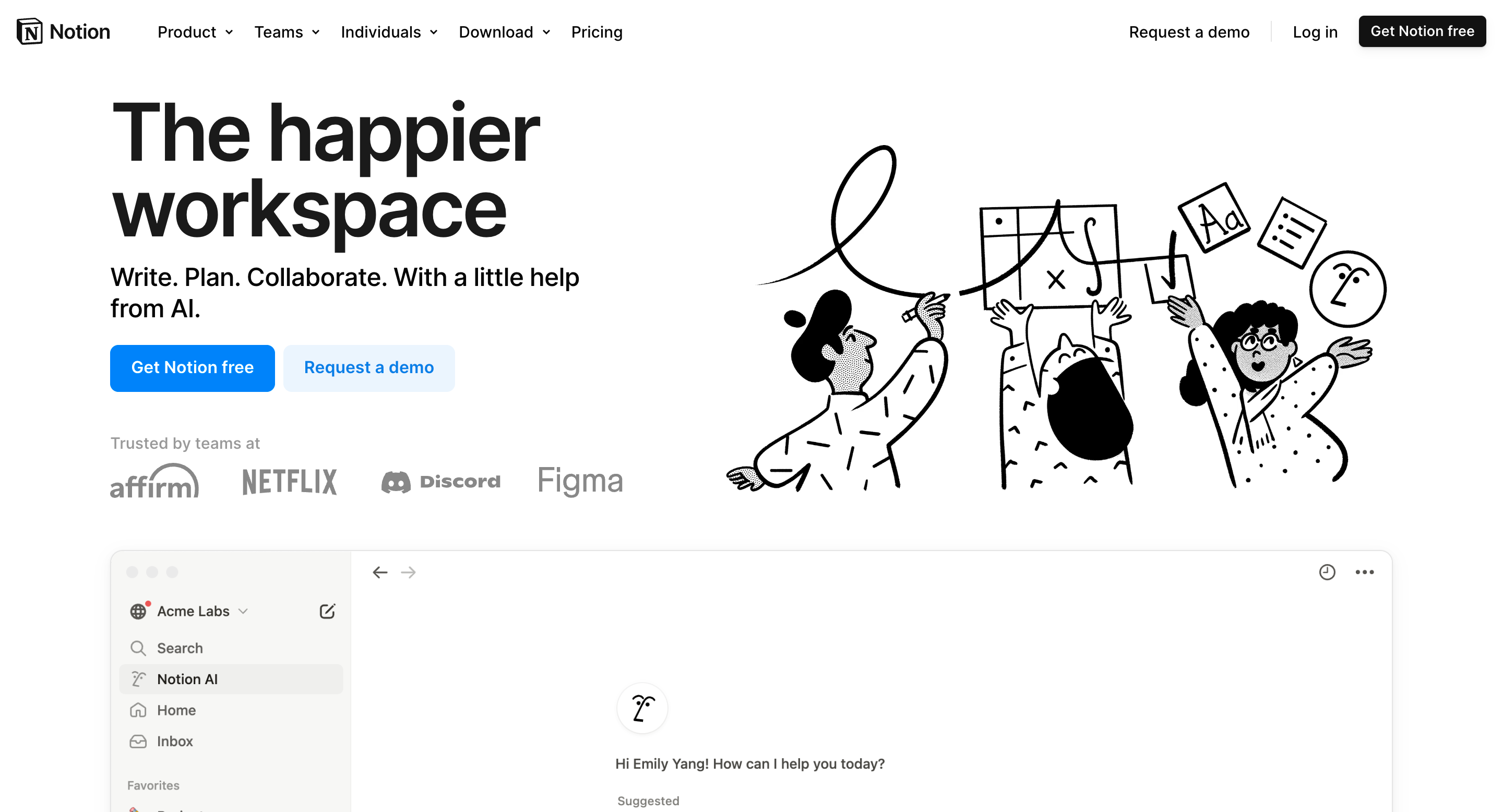
Notion transforms your daily planner into a connected workspace where tasks, notes, and schedules live together in perfect harmony.
Notion eliminates friction by connecting everything in one place.
The foundation of daily planning in Notion is its database system. Each task can link directly to your meeting notes, project docs, or any other relevant information.
When you’re planning tomorrow’s team meeting, the agenda, attendee notes, and action items are all right there.
Notion’s approach to views makes this power accessible.
You might start your day with a simple task list, switch to a calendar view for scheduling, and then use a Kanban board to manage project workflow.
Same data, different perspectives.
Notion lets you grab pre-built planning setups and modify them to match your workflow. A product manager’s daily plan looks very different from a writer’s – Notion handles both beautifully.
AI assistance in Notion takes a unique approach compared to what we saw with Motion.
Instead of trying to manage your schedule, it helps you write better task descriptions, summarizes your meeting notes into action items and helps organize your information.
Features
- Database-Driven Planning: Create powerful task systems with linked information.
- Multiple Views: Calendar, list, board, and timeline views for different planning needs.
- AI Writing Assistant: Smart help for task descriptions and note summarization.
- Template Gallery: Pre-built planning setups for different workflows.
- Cross-Platform Sync: Perfect synchronization across all devices.
- Custom Fields: Track any information relevant to your tasks.
- Relation Databases: Connect tasks to projects, notes, and other information.
Price & Plans
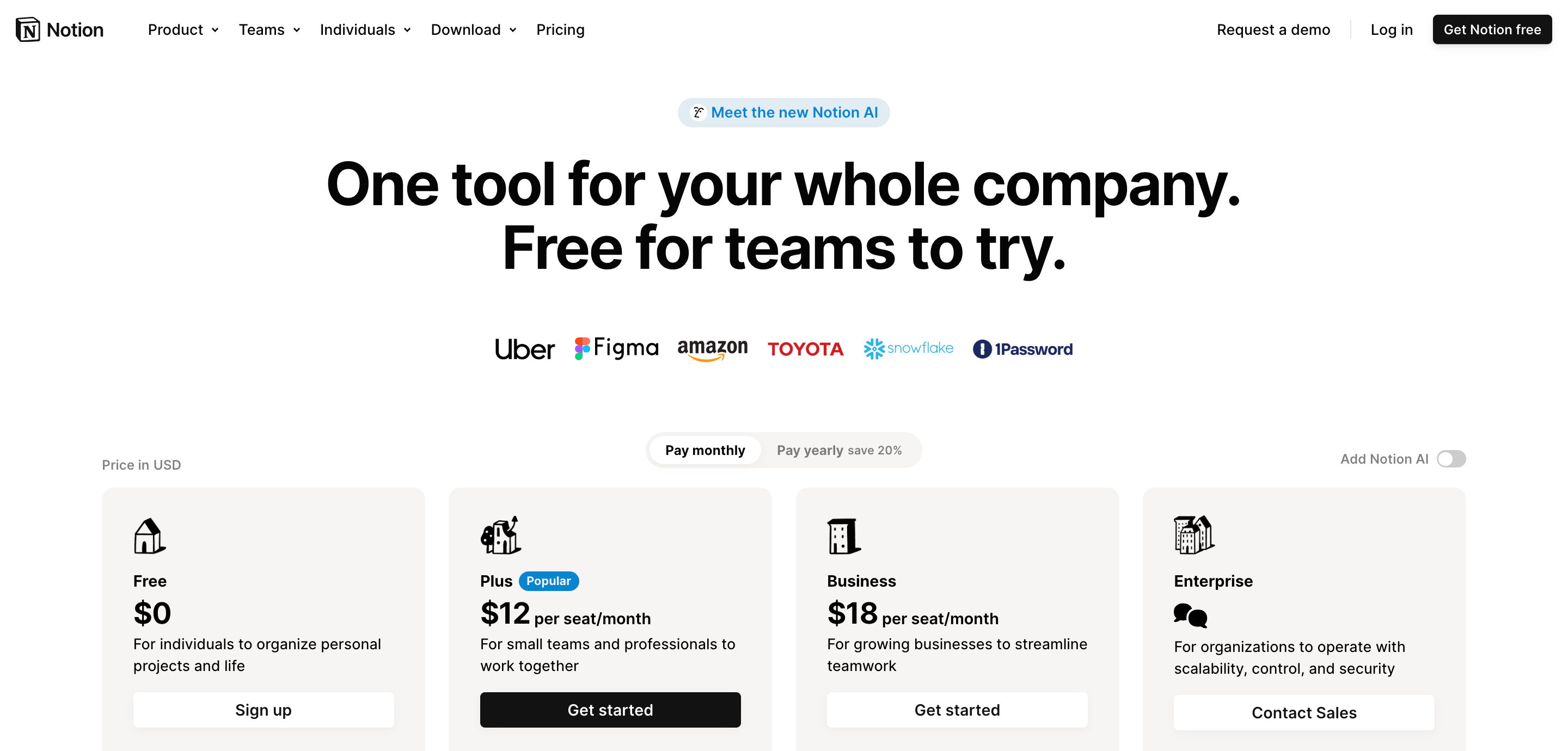
- Free: Personal planning basics.
- Plus: $12 per month ($10 annually).
- Business: $18 per month ($15 annually).
AI features are available for an extra $8/month annually or $10/month monthly.
7. Marvin

Marvin is when behavioral psychologists build a productivity system. It helps you understand and work with your own psychological patterns.
Here’s what I mean.
Instead of just letting you list tasks, Marvin has something called a “Procrastination Wizard” that kicks in when you’re avoiding work.
It’s a friendly therapist built into your task manager.
This matters because most of us don’t fail at productivity because we can’t make lists. We fail because we can’t get ourselves to actually do the things on those lists.
The customization options in Marvin make Todoist’s flexibility look rigid by comparison. You can build literally any workflow you can imagine.
Want to see only one task at a time?
There’s a “Super Focus Mode” for that.
Feeling overwhelmed?
The “Task Jar” lets you randomly pick something to work on.
Despite all this power, Marvin works great right out of the box. It’s like a professional camera that has both an “auto” mode and manual controls for when you’re ready to dig deeper.
The feature set is almost overwhelming – time blocking, habit tracking, built-in timers, time estimates, and dozens more.
However, each feature in Marvin exists to solve a specific psychological barrier to getting things done.
Features
- Procrastination Tools: Built-in wizard and psychological strategies for overcoming task avoidance.
- Super Focus Mode: Shows one task at a time for maximum concentration.
- Task Jar: Random task selection for decision paralysis.
- Time Management: Comprehensive time blocking, tracking, and estimation tools.
- Customizable Workflows: Build your perfect system with modular features.
- Smart Lists: Create filtered views based on any criteria.
- Project Management: Nested categories with sequential and parallel task support.
Price & Plans

Marvin offers a 30-day free trial and then a simple pricing structure:
- Monthly: $12 per month
- Annual: $8 per month (billed yearly)
They also offer a 50% student discount and are known to work with members who can’t afford the full price – a refreshingly human touch in the software world.
8. Akiflow

Akiflow is a productivity platform that unifies task management, time blocking, and team coordination through AI-powered automation and a universal inbox system.
Akiflow’s core insight is that managing time and tasks separately is as inefficient as having two different apps to read and write emails.
The Universal Inbox is where this philosophy comes to life. Akiflow automatically pulls in everything from over 3,000 apps.
Next, we have a time-blocking capability. Akiflow gives you a drag-and-drop interface that feels like moving sticky notes around on a glass wall. It’s powerful but never feels rigid.
What’s particularly clever is how it handles meetings.
While tools like Any.do focus on personal task management, Akiflow builds team coordination right into its DNA.
You can check your coworkers’ schedules with a single click—no more awkward “when are you free?” messages.
There’s also this smart notification system that feels like it was designed by someone who actually understands how humans work.
Instead of bombarding you with alerts, it gives you exactly what you need to know, when you need to know it.
Features
- Universal Inbox: Automatically imports from 3000+ apps into one place.
- AI Co-pilot: Learns your habits to help organize tasks.
- Time Blocking: Drag-and-drop interface for flexible scheduling.
- Team Calendars: One-click access to coworker schedules.
- Smart Notifications: Context-aware alerts across devices.
- Command Bar: Quick shortcuts for common actions.
Price & Plans

- Pro Monthly: $34 per month
- Pro Yearly: $19 per month (billed annually)
- Student discounts are available upon request
9. Todoist

Todoist is what happens when you strip away all the fancy AI algorithms and forced planning routines, leaving you with just the essentials of task management.
The magic happens in how you add tasks. After 17 years of refinement, Todoist has mastered natural language input.
Type “submit report every Monday at 9am starting next week” and it just works. No awkward date pickers, no mandatory fields, no friction.
While some apps force you into their workflow (looking at you, Motion), Todoist gives you building blocks – projects, labels, filters, priorities – and lets you create whatever system makes sense to you.
Despite this flexibility, Todoist maintains perfect order. Your tasks sync instantly across every device you own.
For teams, Todoist takes an unusually thoughtful approach. Instead of forcing everyone into a shared workspace like most apps do, it creates a clean separation between personal and team tasks.
You can manage your grocery list and your product roadmap in the same app without them ever colliding.
Features
- Natural Language Quick Add: Capture and organize tasks using conversational language with smart date recognition
- Project Management: Organize work and personal tasks into customizable projects with sections and subtasks
- Smart Prioritization: Mark task importance with priority levels and create custom filters for focused views
- Team Collaboration: Share projects, assign tasks, and discuss details with team members in shared workspaces
- Calendar Integration: View and manage tasks in list, board, or calendar layouts for flexible planning
- Recurring Tasks: Set up repeating tasks with natural language and complex recurrence patterns
- 80+ Integrations: Connect with email, calendar, and productivity tools to capture tasks from anywhere
Price & Plans

Todoist offers a forever-free plan and two paid plan options:
- Pro: $5 per month ($4 when paid annually)
- Business: $8 per member per month ($6 annually)
The Pro plan includes everything most individuals need: 300 projects, reminders, and unlimited activity history.
The Business plan adds team-specific features like shared workspaces and admin controls.
10. Structured

Sometimes the best way to solve a problem is to draw it. That’s the insight behind Structured, a daily planner that turns your tasks and calendar into a visual timeline.
What’s interesting is how this changes the way you think about your day.
When you see your tasks laid out on a timeline, you start making better decisions about what’s actually possible.
Structured is simple to use, which reminds me of Todoist’s natural language input. But instead of just capturing tasks, you’re placing them directly into your day.
Their AI implementation is clever. Structured understands when you type “lunch with Sarah tomorrow at noon” and puts it right where it belongs.
What surprised me most was the attention to accessibility.
They’ve built-in features for ADHD, autism, and dyslexia users. Most productivity apps seem to assume everyone’s brain works the same way. They don’t.
The customization options strike a nice balance. You get color coding and icons like TickTick, but they’re in service of the timeline view, not just decorative features.
Features
- Visual Timeline: Plan your day with an intuitive, drag-and-drop interface.
- Smart Task Creation: Natural language input with AI assistance.
- Accessibility Focus: Built-in support for various cognitive styles.
- Cross-device Sync: Keep your timeline updated everywhere.
- Calendar Integration: Combine events and tasks in one view.
- Focus Timer: Built-in tools for staying on task.
- Custom Icons and Colors: Visual organization that makes sense.
Price & Plans

- Free: Core timeline and basic task management.
- Pro Monthly: $4.99.
- Pro Yearly: $14.99.
- Lifetime: $49.99 one-time payment.
11. Bordio

Bordio is a daily planning platform that combines task management, time tracking, and team coordination into a visual workspace where you can see exactly how your day unfolds.
The difference becomes clear the moment you open the app.
Instead of an endless task list, you get a visual timeline of your day. Each task and meeting sits in its own time block, showing you precisely when you’ll do what.
Say you’re managing a marketing campaign.
Your tasks live in the main timeline, future ideas go to the waiting list, and your time blocks show exactly when you’ll work on each piece. When plans change (they always do), just drag and drop to reorganize.
You have to know about their waiting list feature.
Bordio does not force you to mix future tasks with current ones. It separates them. Current work stays focused, future work stays organized.
Time tracking reveals surprising patterns.
You might think that the report takes two hours, but after tracking a few weeks, you realize it consistently takes four. Now you can plan better.
Google Calendar integration works both ways – your existing calendar events show up in Bordio, and Bordio tasks appear in your calendar. One schedule, no conflicts.
Features
- Visual Timeline: Plan your day with draggable time blocks and clear task boundaries.
- Waiting List: Separate space for future tasks and ideas, keeping your current timeline focused.
- Workload Management: See team capacity across tasks and meetings in one view.
- Time Tracking: Built-in timer with historical data for better planning.
- Project Organization: Multiple views and contexts in one workspace.
- Real-time Collaboration: Task-specific chat, file sharing, and progress tracking.
- Google Calendar Sync: Bi-directional integration keeps all schedules aligned.
Price & Plans

Bordio offers a free-forever plan for personal use. It includes essential features like personal projects, basic task management, and the waiting list feature.
For teams and organizations, Bordio provides a Pro plan that begins with a special introductory rate of $3.99 per member per month for the first three months.
After this period, the price adjusts to $9.99 per member per month.
This plan unlocks everything Bordio has to offer, including unlimited projects, advanced team features, and comprehensive workload management tools.
Teams can test the full Pro experience with a 14-day trial.
12. Google Calendar

Google Calendar is a cross-platform digital calendar that centralizes all your schedules, events, and time-based tasks while seamlessly integrating with the broader Google ecosystem.
Google Calendar adapts to how you naturally plan your time. When a meeting appears in your inbox, it automatically adds it to your schedule.
When you need to find time with colleagues, it shows everyone’s availability instantly.
Google Calendar handles personal, work, and shared calendars natively. You can overlay them for a complete view or toggle them individually when focusing on specific areas of your life.
The mobile experience sets a new standard.
Every change syncs instantly across devices, and the offline mode ensures you’re never cut off from your schedule.
Calendar even lets you customize notifications per calendar and event type.
Team meeting?
Get a 10-minute warning.
Dinner reservation?
Maybe just a gentle reminder that morning.
The color coding system transforms complex schedules into instantly understandable visual patterns.
Each calendar can have its own color, making it immediately clear which part of your life an event belongs to.
Features
- Automatic Event Detection: Email-based event creation.
- Multiple Calendar Views: Day, week, month, and schedule perspectives
- Smart Notifications: Context-aware reminders.
- File Attachments: Documents and resources linked to events.
- Custom Recurrence: Complex scheduling patterns.
- Guest Management: Granular sharing permissions.
- Video Integration: One-click meeting links.
Price & Plans
Google Calendar is free to use. If you want access to the premium features, consider subscribing to the Google Workspace which starts at $6 per month.
Pick Your Planning Superpower
If you’re the type who needs structure and guidance, Sunsama’s daily planning ritual might be your perfect match.
If you’d rather have AI handle the tedious parts of planning, Motion could be your secret weapon.
Want something simple that just works?
Todoist or TickTick might be your speed.
For the visual thinkers, Bordio or Structured could be game-changing. Seeing your day laid out visually does something that lists just can’t match.
And if you need deep customization, Notion or Marvin let you build exactly the system you want.
But here’s what matters most: you don’t have to get it perfect right away.
Start with something that feels natural to you. Maybe that’s just Google Calendar. That’s fine. You can always evolve your system as your needs change.
